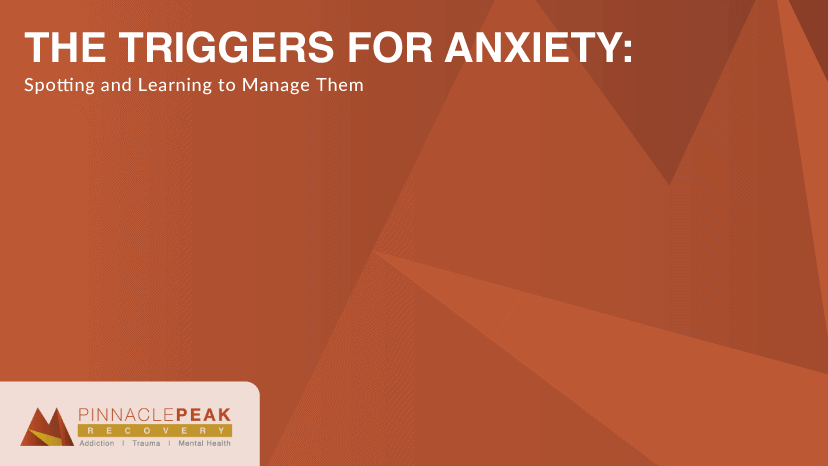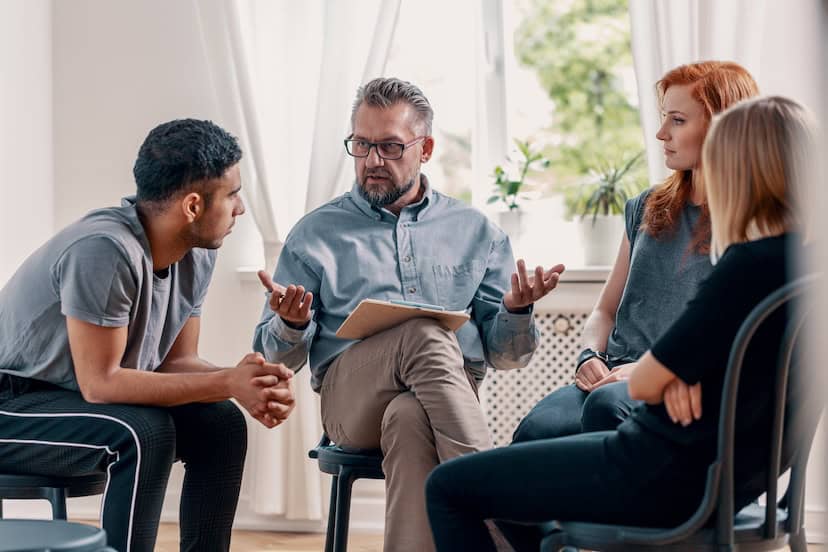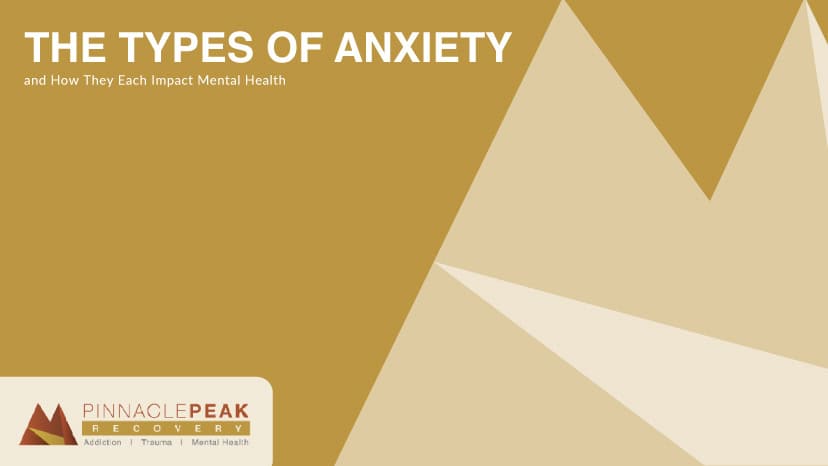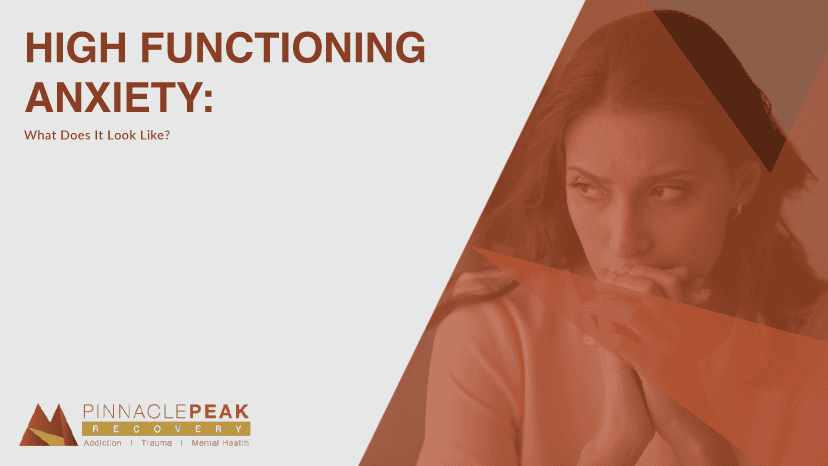The Triggers for Anxiety: Spotting and Learning to Manage Them

“Worry often gives a small thing a big shadow.” — Swedish proverb
Nearly half a million adults in Arizona reported receiving mental health care within the past year. The true number of Arizonans who have a mental health condition, however, is much higher than that.
Whether or not you know someone who’s receiving treatment for their mental health, people who need assistance with their mental health are all around you. It could be their job is overwhelming them with stress, or they’re dealing with the loss of a loved one, or any other multitude of things. At the end of the day, knowing how to spot key components of mental health is an important skill to have.
Our team here at Pinnacle Peak Recovery has a history of helping people with their mental health. Today we wanted to provide educational information about triggers for anxiety, how to spot them, and what to do when they happen.
What Is a Trigger?
When you think about the word “trigger” the first thing that likely comes to mind is the part of a gun used to make it fire. In this case, the “trigger” is a key component that causes a new reaction to happen.
This philosophy applies to mental health, as well. A trigger in the world of mental health is an event that causes you to react, most often in a negative way. These events can be anything from a sound to a location or even a scent. Triggers are specific to an individual, though some triggers are more common than others. We’ll touch on that later.
Can Anyone Experience a Trigger?
Triggers are most often associated with trauma. Not everyone reacts to trauma the same way. Some people can experience a traumatic event and not be greatly affected by it in the long run. Other people may experience something similar and have it impact them for years. Trauma, as a whole, can often be a contributing factor to depression, anxiety, PTSD, and more.
Even though triggers occur most frequently amongst those dealing with a mental health condition, they’re not mutually exclusive. Anyone can experience a trigger at some point in their life.
The Relationship Between Anxiety and Triggers
In order to better understand how triggers can impact anxiety, let’s first better define what anxiety is.
Anyone can experience anxiety; it’s a feeling akin to nervousness, stress, or worry. Most often, though, when people are talking about “anxiety” they’re referring to a generalized anxiety disorder, or GAD. This is a person who experiences heightened worry, often about things outside of their control, so much so that it begins to take control of their life.
People with GAD can have certain events or scenarios that cause them higher anxiety than others. For example, one person might experience extreme anxiety when driving, while another might experience it when they’re home alone.
In this instance, triggers relating to anxiety are instances that cause anxiety to start or increase greatly.

What Are the Most Common Triggers for Anxiety?
There’s no way to fit an exhaustive list of triggers into one blog post. Everyone has their own triggers, and even similar triggers often have the slightest differences. Despite this, there are many triggers that are more common than others. Learning about these triggers can help you spot ones outside this list.
- Loud sounds - These are often triggers for two main reasons. The first is an association with violence most often in people who are dealing with PTSD. The second primarily comes from the sudden, harshness of the sound. The adrenaline spike, shakiness, and increased heart rate are many of the same symptoms of anxiety and can lead to this effect lingering.
- Large crowds - Anxiety can cause stressful situations, like traffic or large crowds, to become even more overwhelming. The unpredictability combined with the difficulty of navigating or feeling like you can’t easily escape can quickly heighten anxiety.
- Bad weather - This can often tie together with loud sounds, but it still stands on its own. Because of the build-up combined with the chance of high danger, anxiety can build up and linger until the situation passes.
- Conflict - Heated emotions and shouting are frequent triggers of anxiety. This can be simply due to how our heart rates speed up, mimicking how anxiety impacts the body. Often, though, this reaction can be tied directly to abuse and trauma.
- Food - From overeating to undereating, or even reactions to specific foods, this can trigger anxiety for many people. Sometimes food can be tied to negative body image, other times low nutrients can lead to an increase in mental health side effects.
- Specific people/places - These triggers will range the most from person to person. They are usually linked to traumatic events, whether they personally experienced them or not.
How Can You Handle Triggers at Home?
Whether you haven’t started your recovery journey yet, or you’re years into the process, the largest portion of your healing takes place in your own home. Triggers can be experienced at any time or place, so being able to handle them outside of immediate treatment is important.
One of the most important things you can do to manage your triggers is to have a trusted individual help you. Anxiety can be all-consuming. Having a friend or loved one who knows your signs and knows how to help you work through your anxiety is a powerful tool to have.
Another powerful tool at your disposal is journaling. This can happen on your phone, tablet, in a notebook, or anywhere that makes sense to you. The primary point of journaling for anxiety is to give you a space to work through your emotions. It can also be a powerful tool for tracking when triggers occur, how they occur, and where. This information can help you identify patterns and be more prepared if you notice them happening again.
When learning how to manage your specific triggers on your own, it’s important to speak with your therapist about what options will work best for you. They will be able to best help you make a plan to suit your needs.
Learning to Recognize Your Triggers
While you can handle anxiety without knowing what your triggers are, there are many benefits to being able to identify triggers. When you have a concrete idea of what scenarios, sounds, visuals, and more impact your anxiety, you can be more prepared when these triggers occur.
Triggers can evolve and develop over time. This means that even if you know of several triggers that you have, you might not know them all.
This is where both of our previous advice points can help. Having a loved one who knows what your anxiety manifests as can give you another point of reference for the events that happened leading up to your anxiety peaking.
Journaling also helps, allowing you to take the time to evaluate the situation afterward and take notes on it. You can use these notes to reference later if you experience another unknown trigger to see if they’re related.

The Treatment Options for Triggers and Anxiety in Arizona
If you or your loved one are dealing with anxiety triggers, there are many anxiety treatment options available for you.
Anxiety and triggers aren’t something that can be fixed overnight. Depending on your specific needs and situation, you might benefit from starting an inpatient program. This allows you to be in a space where you can be safe and focus solely on recovery. When you begin your healing journey, you will work with medical professionals to help determine what program will work best for you.
Here at Pinnacle Peak Recovery, we have all of these options available and more. We focus on evidence-based treatment to ensure you have access to a variety of programs. This allows you to work through our program to find the best combination for your needs. If you’d like to get started, you can give us a call today at 866-377-4761.
Clinical Excellence | Compassionate Care | Family Feel
FAQs
How do you stop anxiety triggers?
Triggers aren’t something that can be addressed overnight. Through proper therapy and treatment, you can learn how to better manage your reactions or desensitize yourself from certain triggers.
Should I avoid things that trigger my anxiety?
There’s a time and place where facing things that trigger you can be healthy for better managing your anxiety. This is often done in a safe environment or with the coaching of a therapist. If certain triggers greatly overwhelm you, it’s important to recognize your own limits and have plans should you encounter them.


